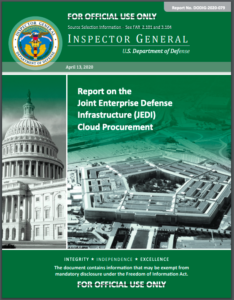
President Donald Trump
UPDATED: Adds Microsoft & expert comments
WASHINGTON: In the latest twist in the JEDI cloud computing saga, the Pentagon’s Inspector General has released a report that’s as remarkable for what it leaves out as what it says. The IG tried to determine whether President Trump’s public attacks on Amazon led White House officials to sway the Pentagon process in favor of rival Microsoft, as Amazon claims. But the Defense Department’s own lawyers instructed witnesses not to answer the IG’s question lest they violate “presidential communications privilege.”
The good news for the Defense Department? After interviewing more than 80 officials and reviewing over 33 gigabytes of documents, “our review … concluded that the DoD’s decision to award the JEDI Cloud contract to a single contractor was consistent with applicable law and acquisition standards,” says the report released this morning. “We do not draw a conclusion regarding whether the DoD appropriately awarded the JEDI Cloud contract to Microsoft rather than Amazon Web Services [because] we did not assess the merits of the contractors’ proposals or DoD’s technical or price evaluations.”
A Pentagon spokesman was quick to hail the report – and slam the media. “The Inspector’s General final report on the JEDI Cloud procurement confirms that the Department of Defense conducted the JEDI Cloud procurement process fairly and in accordance with law,” Lt. Col. Robert Carver said in a mass-email. “The IG’s team found that there was no influence by the White House or DoD leadership on the career source selection boards who made the ultimate vendor selection. This report should finally close the door on the media and corporate-driven attacks on the career procurement officials who have been working tirelessly to get the much-needed JEDI cloud computing environment into the hands of our frontline warfighters while continuing to protect American taxpayers.”
UPDATE Microsoft swiftly hailed the report and posted a blog by its deputy general counsel, Jon Palmer, noting that one of the few improprieties the IG found arguably gave Amazon an unfair advantage, not them. “Should a company, like Amazon, that bid high and lost, now get a do-over, especially now, as the IG’s report makes clear, Amazon received additional proprietary information about Microsoft’s bid that it should never have had?” Palmer asked. “Amazon’s suggested approach – bid high, lose, try again – isn’t fair. It’s the opposite.” END UPDATE
What The Inspector General Actually Said
It’s true the Inspector General deemed the award process fair. That said, the report does say that two of the many officials it investigated did act improperly: Deap Ubhi of the Defense Digital Service, who later went to work for Amazon, and Stacy Cummings, a deputy assistant secretary for acquisition who owned stock in Microsoft. But it determined their role in JEDI was so early on and so limited that they did not compromise the process.
It’s also true that the IG interviewed the relatively low-level officials who actually ran the procurement and concluded – apparently, based on their own testimony – that they had not been improperly influenced by the president’s public statements or their senior leaders. Indeed, the Pentagon chiefs who were most likely to talk with White House staff mostly didn’t even know who the selection officials were:
“None of these witnesses told us they felt any outside influence or pressure for or against a particular competitor as they made their decisions on the award of the contract. These witnesses also told us that public statements from the President and ‘media swirl’ about the contract did not directly or indirectly influence the integrity of the procurement process or the outcome of the JEDI Cloud source selection,” the report says. “The DoD personnel who evaluated the contract proposals and awarded Microsoft the JEDI Cloud contract were not pressured regarding their decision on the award of the contract by any DoD leaders more senior to them, who may have communicated with the White House…. Most of their identities and involvement in the procurement award were unknown to White House staff and even to the senior DoD officials.”
But the IG pointedly said it could not determine whether or not the White House tried to influence the award: “We sought to review whether there was any White House influence on the JEDI cloud procurement. We could not review this matter fully because of the assertion of a ‘presidential communications privilege,’ which resulted in several DoD witnesses being instructed by the DoD Office of General Counsel not to answer our questions about potential communications between White House and DoD officials about JEDI. “
The IG did try. “We provided the DoD Office of General Counsel with a list of questions, separated specific to each witness, [and the] General Counsel told us they then asked White House Counsel to review the list of questions and identify the subject areas, or specific questions, over which the President would assert the presidential communications privilege,” the report says. “After our repeated requests for a response, on February 25, 2020, the DoD Office of General Counsel stated that White House Counsel was only willing to allow witnesses to provide written answers to our questions where the presidential communications privilege was invoked; however, it stated that no representation could be made as to the number or extent of questions that could be answered, and that any written responses would require further review by White House Counsel on the issue of maintaining the privilege.
“We carefully considered this response and concluded it would not be an appropriate and practical way to conduct our review, because there was no assurance as to which questions would be answered, it would unduly delay the report, it would not allow for an interview and inevitable follow up questions, and it would not assure that we would be receiving full information from the witnesses,” the report goes on. “We therefore declined to proceed in this manner.”
“Therefore,” the IG says, “we could not definitively determine the full extent or nature of interactions that administration officials had, or may have had, with senior DoD officials regarding the JEDI Cloud procurement.”
So, this report is unlikely to end the ongoing public controversy and legal battle over JEDI. In fact, the IG says that, since it only evaluated the award process, not the facts of each company’s bid, it can’t say anything about whether Microsoft was the right choice – the main fact in dispute in Amazon’s suit before the Federal Court of Claims. If anything, the IG has just provided more ammunition for arguments that the White House is not being transparent about its role.

Andrew Hunter
UPDATED: Experts Warn This Isn’t Over
“The IG ruling gives us half the story,” said Andrew Hunter, a former DoD acquisition official himself, who now heads defense-industrial studies at the thinktank CSIS. “The source selection team has asserted that they made the decision on the merits and without being forced to an outcome by superiors in the Department. The question of whether they correctly decided the competition on the merits as defined in the solicitation is what the Court of Federal Claims will decide in the bid protest.”
“So I’d say the IG report gives us a significant piece of the puzzle, but the puzzle isn’t yet done,” Hunter continued. “The IG report does undercut some of the public rhetoric that the decision in favor of Microsoft could only have been a political one. At the same time, the refusal by the White House to allow witnesses to testify, based on a Presidential communications privilege, seems to invite further investigations by Congress, as it seems to imply the President or his senior staff was directly engaged with DoD on a source selection decision.”
“There is still this lack of trust in the procurement system that the IG report hasn’t completely dampened down,” agreed Bill Greenwalt, a former Hill and DoD official.

Bill Greenwalt
What’s missing?
“The key thing to look at is whether JEDI requirements were dumbed down or manipulated during this process to factor out any of Amazon’s technical and first-to-market advantages,” Greenwalt said. “It doesn’t look like the IG looked at that question — but I would assume the Court of Federal Claims will.”
Yes, he said, “the source selection officials at the lower level that the IG interviewed probably were not influenced — but the question that would still remain is whether the criteria they awarded on were tailored in such a way to favor only one particular contractor.”
The current Amazon protest taps into a longstanding perception that the system can be rigged,” Greenwalt lamented. “Unfortunately, there may be some truth to that perception, as it derives from a long history of the services and DOD having to manipulate requirements to favor a particular vendor that Congress wanted, because appropriations earmarks were not always written with an exemption from legal competition requirements.”
Congressional earmarks are now banned — but as a result, acquisition has in some ways become “even more opaque,” Greenwalt said. “If a procurement can be manipulated for Congress, why not for the executive branch?”
Australia unveils ‘historic’ defense boost to 2.4% of GDP in decade, but critics say too little, too late
Part of the shakeup includes tens of billions for nuclear-powered subs, and halting the pricey procurement of an additional F-35 fighter jet squadron.




























